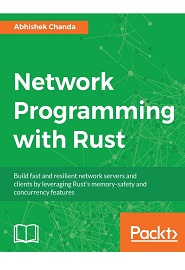
English | 2018 | ISBN: 978-1788624893 | 278 Pages | PDF, EPUB | 10 MB
Learn to write servers and network clients using Rust’s low-level socket classes with this guide
Rust is low-level enough to provide fine-grained control over memory while providing safety through compile-time validation. This makes it uniquely suitable for writing low-level networking applications.
This book is divided into three main parts that will take you on an exciting journey of building a fully functional web server. The book starts with a solid introduction to Rust and essential networking concepts. This will lay a foundation for, and set the tone of, the entire book. In the second part, we will take an in-depth look at using Rust for networking software. From client-server networking using sockets to IPv4/v6, DNS, TCP, UDP, you will also learn about serializing and deserializing data using serde. The book shows how to communicate with REST servers over HTTP. The final part of the book discusses asynchronous network programming using the Tokio stack. Given the importance of security for modern systems, you will see how Rust supports common primitives such as TLS and public-key cryptography.
After reading this book, you will be more than confident enough to use Rust to build effective networking software.
What You Will Learn
- Appreciate why networking is important in implementing distributed systems
- Write a non-asynchronous echo server over TCP that talks to a client over a network
- Parse JSON and binary data using parser combinators such as nom
- Write an HTTP client that talks to the server using reqwest
- Modify an existing Rust HTTTP server and add SSL to it
- Master asynchronous programming support in Rust
- Use external packages in a Rust project
Resolve the captcha to access the links!